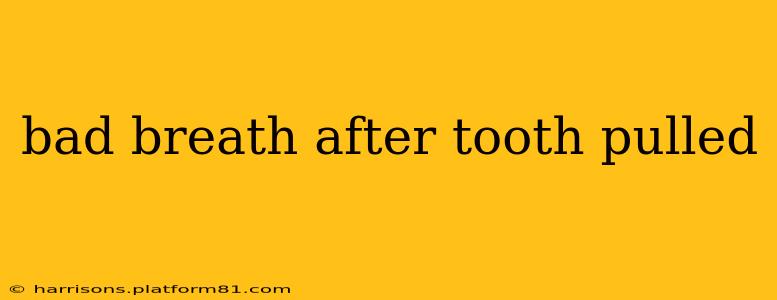Bad breath, or halitosis, is a common concern, and it can be especially frustrating after a tooth extraction. While the initial discomfort of the procedure fades, lingering bad breath can be a persistent annoyance. Understanding the causes, preventative measures, and treatment options can help you regain fresh breath and confidence.
Why Does My Breath Smell Bad After a Tooth Extraction?
Several factors contribute to bad breath following a tooth extraction. The most prominent reasons include:
-
Blood Clots and Tissue Debris: The extraction site is a wound, and as it heals, blood clots form. These clots, along with bits of tissue and food debris, can become breeding grounds for bacteria. Bacterial activity produces volatile sulfur compounds (VSCs), the primary culprits behind bad breath.
-
Dry Socket (Alveolar Osteitis): This painful complication occurs when the blood clot at the extraction site dislodges prematurely, exposing the underlying bone. Dry socket significantly increases the risk of bad breath due to the increased bacterial activity in the exposed area.
-
Infection: Infection at the extraction site is another potential cause of foul-breath. This is more likely if proper post-operative instructions are not followed or if there's a pre-existing infection.
-
Poor Oral Hygiene: Neglecting oral hygiene practices after an extraction can lead to a buildup of bacteria and food particles, exacerbating bad breath.
-
Medication Side Effects: Some medications can have dry mouth as a side effect, which reduces saliva production. Saliva plays a crucial role in cleansing the mouth and neutralizing odor-causing bacteria. Dry mouth can make bad breath more likely.
How Can I Prevent Bad Breath After a Tooth Extraction?
Preventing bad breath after a tooth extraction involves diligent post-operative care:
-
Follow Your Dentist's Instructions: Carefully follow all instructions provided by your dentist regarding post-operative care. This includes medication, rinsing, and activity restrictions.
-
Gentle Cleaning: Begin gentle rinsing with saltwater (1/4 teaspoon of salt in 8 ounces of warm water) as soon as your dentist permits. Avoid forceful rinsing or spitting, which can dislodge the blood clot. Use a soft-bristled toothbrush to gently clean the surrounding teeth, avoiding the extraction site directly.
-
Maintain Good Oral Hygiene: Brush and floss regularly, focusing on the areas around the extraction site, but being gentle to avoid irritation.
-
Stay Hydrated: Drinking plenty of water helps stimulate saliva production, keeping your mouth moist and less prone to bad breath.
-
Avoid Smoking and Alcohol: Both can impede healing and increase the risk of infection, leading to persistent bad breath.
-
Eat a Balanced Diet: Nourishing your body with a balanced diet aids in the healing process and supports overall oral health.
-
Regular Dental Checkups: Routine dental visits are essential for maintaining good oral health and catching any potential problems early on.
What Should I Do If I Still Have Bad Breath After a Tooth Extraction?
If you experience persistent bad breath despite following all post-operative instructions, contact your dentist immediately. This could indicate a complication, such as a dry socket or infection, requiring professional attention.
How Long Does Bad Breath Last After a Tooth Extraction?
The duration of bad breath after a tooth extraction varies depending on the individual and the healing process. It typically subsides within a week or two as the extraction site heals. However, if it persists for longer, seek professional dental advice.
Can Mouthwash Help with Bad Breath After a Tooth Extraction?
Using a therapeutic mouthwash, as directed by your dentist, may help manage bad breath. However, avoid using alcohol-based mouthwashes, as these can irritate the extraction site. The best course is usually saltwater rinses as the first line of defense.
Is Bad Breath After a Tooth Extraction a Sign of Infection?
Persistent bad breath, coupled with other symptoms such as swelling, pain, fever, or pus, can be a sign of infection. Contact your dentist immediately if you experience these symptoms. Prompt treatment of an infection is crucial to prevent complications.
By following these recommendations and seeking professional help when needed, you can effectively manage and minimize bad breath after a tooth extraction, promoting faster healing and a healthy, fresh-smelling smile. Remember, consulting your dentist is key to addressing any concerns or complications that may arise during your recovery.
